Atopic dermatitis, commonly known as eczema, is a chronic skin condition that causes dryness, redness, and itchiness. While medical treatments can help, many people use natural remedies to alleviate symptoms and nourish the skin. These DIY solutions are easy to prepare at home, using gentle and effective ingredients. Let’s explore some tried-and-tested natural remedies for managing atopic dermatitis.
What is Atopic Dermatitis?
Atopic dermatitis is a type of eczema that often begins in childhood but can affect people of all ages. It’s characterized by flare-ups, where the skin becomes inflamed, itchy, and irritated. While the exact cause isn’t known, genetics, environmental factors, and a compromised skin barrier play significant roles.
Natural remedies can complement medical treatments by addressing dryness, soothing inflammation, and improving the skin’s protective barrier.
DIY Natural Remedies for Atopic Dermatitis
1. Oatmeal Baths for Soothing Relief
Colloidal oatmeal is one of the most popular remedies for atopic dermatitis. It has anti-inflammatory and moisturizing properties, which help calm irritated skin.
- How to Use: Add one cup of finely ground oatmeal to a warm bath. Soak for 15-20 minutes and pat your skin dry gently. Avoid rubbing, as this can irritate the skin further.
- Benefits: Oatmeal reduces itching, soothes inflammation, and locks in moisture, leaving your skin feeling soft and nourished.
2. Coconut Oil for Deep Hydration
Coconut oil is rich in lauric acid, which has antimicrobial and moisturizing properties. It’s particularly effective for restoring the skin’s natural barrier.
- How to Use: Apply virgin coconut oil to clean, damp skin once or twice daily. Focus on dry or inflamed areas.
- Benefits: This remedy provides deep hydration, reduces redness, and protects against infections caused by scratching.
3. Aloe Vera for Cooling Inflammation
Aloe vera gel is a natural anti-inflammatory and cooling agent, making it ideal for soothing irritated skin.
- How to Use: Extract fresh aloe vera gel from a leaf and apply it directly to affected areas. Let it absorb fully before rinsing or applying a moisturizer.
- Benefits: Aloe vera reduces itching, calms redness, and accelerates the healing process.
4. Honey for Healing and Moisture
Raw honey has antibacterial and anti-inflammatory properties, which can help reduce symptoms of atopic dermatitis and prevent infections.
- How to Use: Apply a thin layer of raw honey to the affected skin. Leave it on for 20-30 minutes before rinsing with lukewarm water.
- Benefits: Honey promotes wound healing, hydrates dry skin, and soothes irritation.
5. Evening Primrose Oil for Long-Term Relief
Evening primrose oil is rich in gamma-linolenic acid (GLA), an omega-6 fatty acid that helps reduce inflammation and improve skin elasticity.
- How to Use: Apply a few drops of evening primrose oil to the affected areas or take it as a dietary supplement after consulting a healthcare provider.
- Benefits: This oil reduces itchiness and supports overall skin health.
6. Apple Cider Vinegar for Balancing Skin’s pH
Apple cider vinegar can help restore the skin’s natural pH balance and reduce flare-ups when used correctly.
- How to Use: Dilute one part apple cider vinegar with two parts water. Apply it to the skin using a cotton ball and rinse after 5-10 minutes.
- Benefits: This remedy soothes irritation, reduces bacteria, and promotes a healthy skin barrier.
Additional Tips for Managing Atopic Dermatitis
- Moisturize Regularly: Use fragrance-free, hypoallergenic moisturizers to keep your skin hydrated.
- Avoid Triggers: Identify and avoid irritants, such as harsh soaps, fragrances, and allergens.
- Use Gentle Fabrics: Opt for soft, breathable materials like cotton to reduce skin irritation.
- Stay Hydrated: Drink plenty of water to maintain skin hydration from within.
- Consult a Dermatologist: Always seek professional advice if symptoms worsen or don’t improve with natural remedies.
Conclusion
Managing atopic dermatitis doesn’t have to rely solely on medical treatments. DIY natural remedies like oatmeal baths, coconut oil, and aloe vera can provide soothing relief and improve skin health. While these remedies can help, always monitor your skin’s response and consult a dermatologist for persistent or severe symptoms.
Frequently Asked Questions (FAQs)
1. Can natural remedies completely cure atopic dermatitis?
No, natural remedies can help manage symptoms but cannot cure atopic dermatitis. The condition is chronic and requires ongoing care.
2. How often should I use these remedies?
Most remedies, like coconut oil or oatmeal baths, can be used daily. Monitor your skin’s response and adjust the frequency if irritation occurs.
3. Is apple cider vinegar safe for sensitive skin?
Apple cider vinegar should always be diluted to avoid irritation. Perform a patch test before using it on larger areas.
4. Can children use these remedies?
Yes, but always consult a pediatrician before trying new treatments on children. Use gentle, hypoallergenic ingredients like oatmeal or coconut oil.
5. What should I do if my symptoms worsen?
If symptoms worsen or don’t improve with natural remedies, consult a dermatologist for a personalized treatment plan.



